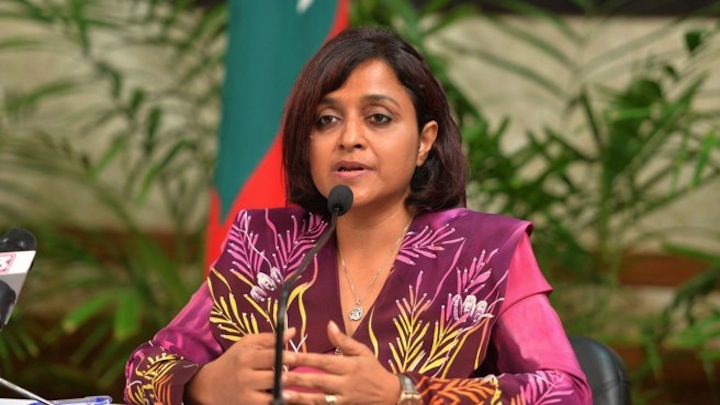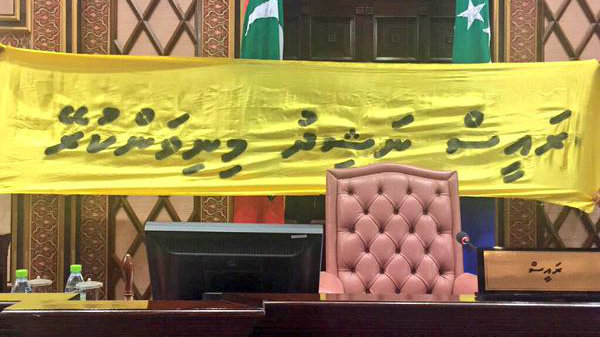The ruling Progressive Party of the Maldives (PPM) and the foreign ministry have slammed a European Union parliamentary resolution urging the government to release ex-president Mohamed Nasheed.
The resolution is based on “fabrications, misconceptions and misrepresentations”, the PPM contended while foreign minister Dunya Maumoon declared that “the human rights achievements of the Maldives is better than some European countries.”
The non-binding resolution adopted today urged member states to issue warnings on the Maldives’ human rights record on their travel advice websites over an increased tendencies towards authoritarian rule, including Nasheed’s imprisonment for 13 years on terror charges.
The EU parliament noted a crackdown on political opponents including the imprisonment of two former defence ministers and a ruling party MP, the intimidation of media and civil society and the politicisation of the judiciary.
But Dunya said the Maldives’ “achievements since 2004 is exemplary for a small state.”
“We have a vibrant political system where people have space to express their political opinions without any hindrance. We do not shoot protesters. There is no looting in the name of political rallies. Our custodial facilities do not torture those under state custody,” she said.
The PPM meanwhile said the EU had issued “equally grossly-misinformed releases” in the past, but “chose to turn a blind eye and stay silent on matters regarding the Maldives during the three year three month regime of former President Mohamed Nasheed, which was the single most brutal, dictatorial and violent period of rule in contemporary Maldivian history.”
The PPM suggested that the European parliament “risks tarnishing its own standing in global society, and it’s reputation among European citizens themselves by refusing, for shrouded political gains, to call a spade a spade.”
“The European Parliament must by now know that its failure to report the truth in matters regarding the Maldives has left its own reputation among the Maldivian public at serious risk of irreversible damage,” reads the PPM statement released today.
The ruling party went on to claim Nasheed’s government arbitrarily arrested political activists and MPs, sent out “knife-wielding thugs” against opposition protesters, unlawfully politicised state media, undermined independent institutions, and carried out corruption amounting to “hundreds of millions of dollars.”
The rise of extremism worsened under Nasheed’s administration, it continued, as its “schizophrenic policies on religious affairs in the country had contributed to the ideological confusion among young people, which has led to some Maldivians fleeing the country to join the ranks of foreign fighters in ISIS-led terrorist conflict zones.”
As Nasheed was found guilty of ordering the “enforced disappearance” of criminal court chief judge Abdulla Mohamed in January 2012 – “a gross Nazi-esque violation” of constitutional rights and international norms – the PPM asked whether the EU condoned the “kidnapping of judges”.
Neither the government nor the public will entertain calls for Nasheed’s release “through the very unlawful and unethical avenues that Nasheed himself employed”.
“This is not a banana republic nor is this a pawn of any regional bloc or external power,” the PPM said.
Hours before the resolution passed, president’s office minister Mohamed Hussain Shareef ‘Mundhu’ told the press he expected a “watered down” resolution, and said the government is “happy” with the resolution as it shows that the current administration is upholding the Maldivian constitution and sovereignty.
“Actionable” clauses such as imposing a travel ban and freezing assets of Maldivian government officials were removed before the resolution was put to a vote, he said.
According to Mundhu, the resolution “praises” Nasheed and EU MEPs are demanding his release as the former president was “a proxy ruler” of Europeans. He alleged that the EU is condemning the Maldivian government for refusing to allow freedom of religion and same sex marriage.
The resolution was pushed through by the UK’s Conservative Party, which Mundhu said was a longstanding ally of Nasheed’s Maldivian Democratic Party (MDP), and the Christian Democratic Party.
Other parties in the European parliament “forced” the Conservative Party to remove the actionable clauses, he claimed.
Mundhu also said the EU refused to extend the duty-free status of fish imported from Maldives due to the country’s stance on freedom of religion and legalising gay marriage.
An EU delegation that visited the Maldives this week had told government officials yesterday that a non-binding resolution by the European parliament was inconsequential and akin to “a resolution adopted by the Baa atoll Thulhadhoo council,” Mundhu said.
President Abdulla Yameen has previously accused the EU of imposing restrictions on Maldivian imports for refusing to abandon Islamic principles.
The country has since sought other markets for fish exports and the EU was no longer “that important economically, outside of tourism”.
 (0)Dislikes
(0)Dislikes (0)
(0)



